Research results
Microfinance in Europe. Social Performance Management Report
The Report presents current state of social performance practices of European microfinance sector in implementing SPM. The main achievements of the sector are positive contribution to sustainability of microbusinesses and support to excluded segments of population. The biggest challenges industry faces are setting S.M.A.R.T. goals during SPM implementation and providing non-financial services as a development possibility.
Digitalizing Microfinance in Europe
The paper summarizes the results of the survey on the use of fintech solutions and digitalization of the customer relations and lending process among MFIs in Europe. While there is a widespread recognition about the need to use digital processes to a larger degree, the ability and willingness of MFIs to do that varies greatly. The results also show that MFIs are cautious about not losing their competitive advantage of personal relationship with their clients. Fintech and digitalization solutions should be applied based on a rational calculus of costs and benefits, in line with the mission of the organization and the needs and capabilities of the clients.
Are Microfinance Borrowers in Lebanon Over-Indebted?
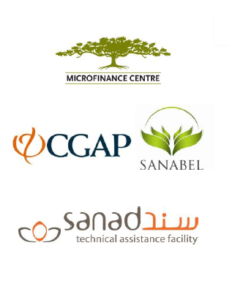
Download Lebanon Over-Indebtedness Study
Microfinance and Business Start-ups: Review of the Current Practice in Europe
The paper explores the theoretical background and the emergent evidence related to the role of access to finance for business start-ups and self-employment in Europe, with a specific focus on the role of microfinance institutions. The paper summarizes opportunities and challenges faced by the microfinance sector to more deeply engage in the entrepreneurship and start-up financing market. Options for larger engagement of the microfinance institutions in the start-up segment close the paper offering several policy recommendations on the EU and individual member state levels to support a greater role of microfinance institutions in financing business start-ups by the excluded groups.
Over-indebtedness Trends in Europe – Issue No. 2
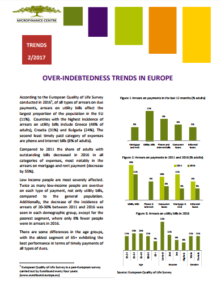
Delivering Financial Capability: A Look at Business Approaches
Financial capability has been a buzz word for almost a decade as more and more financial institutions and other stakeholders recognize that in order to improve financial inclusion, customers need to have the financial capability to use financial services for their benefit.
Many institutions are engaged in designing financial capability programs, however, many pilot programs, often donor-driven, have failed to scale up or integrate with the core business of the institution. CFI Fellow Justyna Pytkowska will explore the viable cases of financial capability interventions that can serve as models for other financial institutions to replicate, contributing to the identification of best practices and innovative delivery models.
Over-indebtedness trends in Europe
According to Eurostat data, the level of over-indebtedness (measured by the incidence of arrears on mortgage, rent, utility bills or hire purchase) decreased in 2016 in most EU countries. Please read our latest release with more information about this trend.
MFC Policy Paper No.5: Demystifying the role of microfinance in job creation
The paper discusses the role of microfinance in job creation through self-employment and microenterprise. Despite high expectations, in general microenterprises have a limited however socially important contribution to job creation. It is necessary to distinguish between growth-oriented young firms that have a potential to create jobs and self-employment and microenterprises which remain small. If microfinance focuses on the latter group, its impact on job creation will remain small. It may be more economical to reposition microfinance to become a more flexible micro-venture instrument that will fund job creators while leaving support for self-employment and microenterprises to other social programs, including seed capital grant funds.
MFC Research paper: Measuring Financial Inclusion in the EU: Financial Inclusion Score Approach
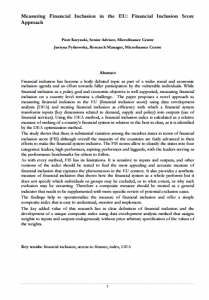
MFC Research paper: Financing Gap and SME Employment Growth: Beyond Access to Finance
The key aim of our research was to investigate the relation between the perceived changes in financing gap and employment growth by SMEs in the EU. The paper builds on and extends the analysis of SAFE survey data, in order to focus on the question of employment creation which is at the core of the current economic policy debate in the EU. The main finding emerging is that changes in the financing gap do not appear to constrain employment growth, but are strongly correlated with job destruction. This innovative research analyzed the role of the perception of external finance accessibility, whereas many other papers study the influence of the actual availability or actual constraints; as such this study points to an important relationship between the opinion of business owners and actual business growth.
Microfinance in Europe: A Survey of EMN-MFC Members. Report 2014-2015
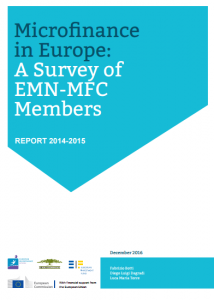
MFC Policy Paper No.4: Too Little or Too Much Credit: Small Business Indebtedness in the EU, 2015
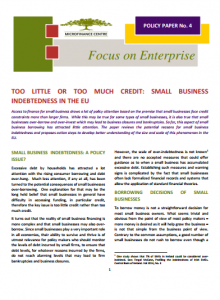
MFC Policy Paper No. 3: Of Mice and Unemployed: Rethinking Micro-Enterprise and Small Business, 2015
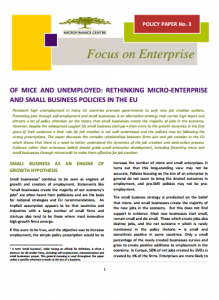
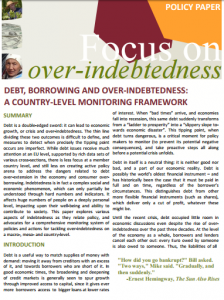
A review of debt burden and over-indebtedness issues shows that debt is a very complex phenomenon, which has economic impact on growth, and a social impact on the well-being of individuals and households. A lot of research and data is available on the topic offering insights into different aspects of indebtedness. What is missing is a higher level, “big picture” approach to consolidate these various strands of findings and policy initiatives, and provide higher level guidance for policy-makers and advocacy groups. The paper proposes setting up “Debt Watch” mechanism in each country for systematic revision of national policies, actions and gaps in addressing over-indebtedness issues.
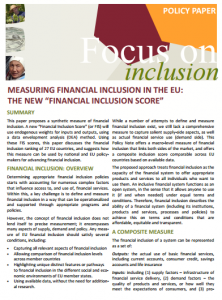
This paper proposes a synthetic measure of financial inclusion. A new “Financial Inclusion Score” (or FIS) uses endogenous weights for inputs and outputs, using a data envelopment analysis (DEA) method. Using these FIS scores, this paper discusses the financial inclusion ranking of 27 EU countries, and suggests how this measure can be used by national and EU policymakers for advancing financial inclusion.
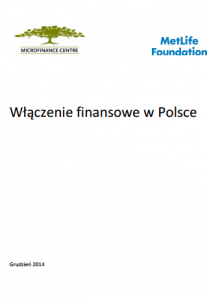
Full text in Polish, executive summary in English
Results of the desk review presentation in Polish, in English
The executive summary presents the main results of the research on financial inclusion of individuals in Poland thus providing insight into the level of usage of various financial products and services as well as into the conditions of access. The Index of Financial Inclusion (IFI) calculated for Poland captures in a summary form the progress in setting appropriate conditions to improve financial inclusion.
Measuring Financial Inclusion in Turkey
This briefing paper summarizes the current state of financial inclusion in Turkey in terms of financial services usage and the level of access to financial services for individuals and SMEs.
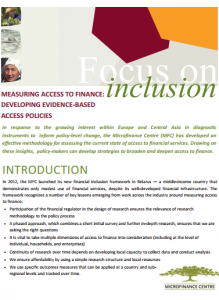
Access to Finance Scorecard (AFS) framework captures diverse aspects of access and usage issues into one comprehensive tool that lends itself to measurement and interpretation that can inform policy making and regulation of financial services. The ‘balanced’ aspect of AFS lies in the fact that it takes into account not only the facts about the supply of and demand for financial services in the traditional way, but also incorporates many other important factors that influence the participation in financial markets by households and firms such as trust in financial institutions, business confidence, financial capabilities and other subjective factors, in addition to the critical assessment of financial sector environment and policies (from the point of view of access) that influence the use of financial services.
This report analyses the level of indebtedness of MSME credit customers and the quality of finance in Bosnia and Herzegovina (BiH). The EFSE Development Facility (DF) commissioned this study in February 2013, following a first study by the EFSE DF on the subject in 2009. The first study (Maurer/Pytkowska, 2010) confirmed the presence of over-indebtedness as defined by the authors, among microcredit borrowers in BiH. The findings show that the majority of borrowers have more than one credit product outstanding. Moreover, multiple and cross-borrowing are still prevalent albeit to a lower degree compared to the 2009 microcredit data sample and high levels of indebtedness still prevail in certain market segments.
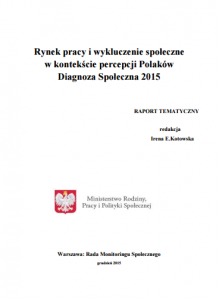
Piąty tematyczny raport ukazujący zagadnienia związane z rynkiem pracy i wykluczeniem społecznym w kontekście percepcji Polaków
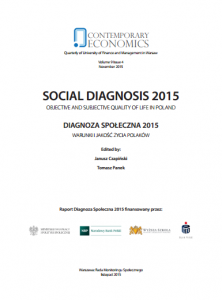
- Tackling the Effects of Crisis in Microfirms in Poland, 2013
- Social Innovations in Microfinance, 2012
- Microentrepreneurs – to Conquer or Survive? Presentation in Polish
- The Risk of Over-indebtedness of Microcredit Clients in Azerbaijan,2012
- Estimation and Analysis of Financial Inclusion among Households and Individuals in the Republic of Belarus. Full text, summary
- Estimation and Analysis of SME Financial Inclusion in the Republic of Belarus. Full text, summary
- Financial Inclusion Policy Survey in the Republic of Belarus.
- Assessment and analysis of Supply of Financial Services to individual consumers in Belarus. Full text, summary
- The impact of matched savings scheme on financial behavior of financial education training participants,2011
- The impact of reminders on financial behavior of financial education training participants, 2011
- Research on Value Chains in Kyrgyzstan and Tajikistan, 2011
- Research on the Level of Indebtedness and Repayment Performance of Individual Borrowers in Kyrgyzstan, 2011 (in English, in Russian) Presentation (in English, in Russian)
- Indebtedness of Microcredit Clients in Kosovo, 2011 Sumarry paper (in English, in Russian, in Albanian)
- Financial Condition of Microenterprises after the Crisis (Poland), 2011
- The Market for Deposit Services of Microcredit-Deposit Organizations (MDO) in Tajikistan, 2010
- Indebtedness of Microcredit Clients in Bosnia and Herzegovina, 2010 (in English, in Russian)
- Re-emerging from the Crisis – Microfinance in ECA, 2010
- Microfinance in ECA on the Eve of Financial Crisis, 2009
- Market for Microinsurance in Armenia. Low-Income Households Needs and Market Development Projections, 2009
-



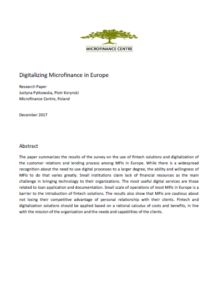
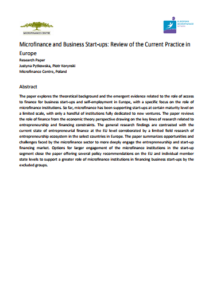
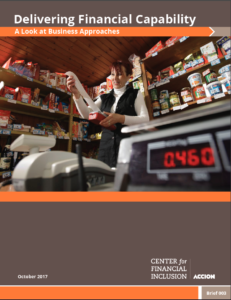
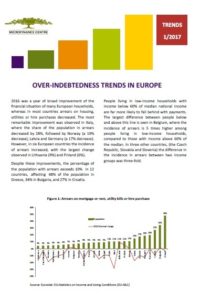
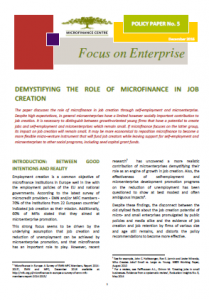
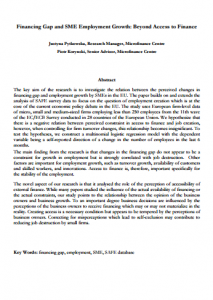
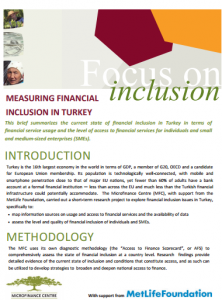
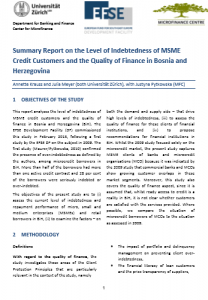 The Level of Indebtedness of MSME Credit Customers and the Quality of Finance in Bosnia and Herzegovina
The Level of Indebtedness of MSME Credit Customers and the Quality of Finance in Bosnia and Herzegovina